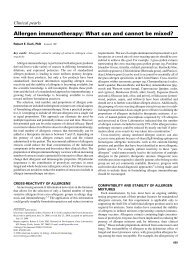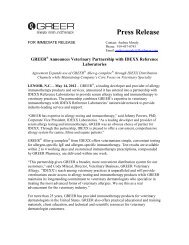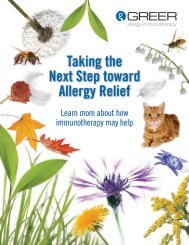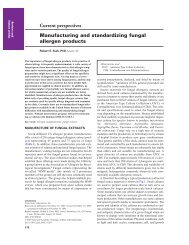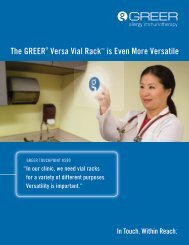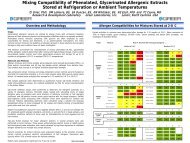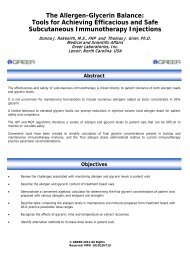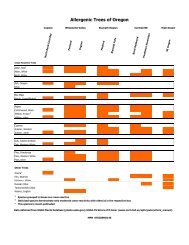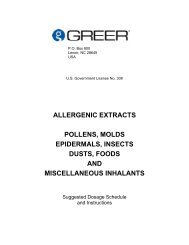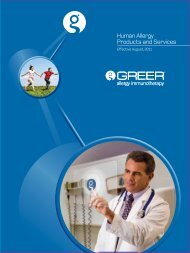Human Allergy Catalog - Greer
Human Allergy Catalog - Greer
Human Allergy Catalog - Greer
Create successful ePaper yourself
Turn your PDF publications into a flip-book with our unique Google optimized e-Paper software.
PREGNANCYTERATOGENIC EFFECTSPREGNANCY CATEGORY C - Animal reproduction studies have not beenconducted with Standardized Grass Pollen Extracts. It is also not known whetherStandardized Grass Pollen Extracts can cause fetal harm when administered to apregnant woman or whether they can affect reproduction capacity. StandardizedGrass Pollen Extracts should be given to a pregnant woman only if clearlyneeded.There is no evidence of adverse effects of allergenic extracts on the fetus. 12Studies have not been performed in animals to determine whether extracts affectfertility in males or females, have teratogenic potential, or have other adverseaffects on the fetus. Caution should be exercised in testing or treating pregnantfemales because a systemic reaction may cause an abortion as a result of uterinemuscle contractions.LABOR AND DELIVERYThere is no known information of adverse effects during labor and delivery.NURSING MOTHERSIt is not known whether allergenic extracts or their antigens are excreted in humanmilk. Because many drugs are excreted in human milk, caution should beexercised when extracts are administered to a nursing woman.PEDIATRIC AND GERIATRIC USEAlthough extracts have not been studied systematically in various age groups,older children and geriatric patients appear to tolerate injections of allergenicextracts well. Children less than five years of age on extract immunotherapymay have an increased risk of a severe reaction, but respond well to skin testdiagnosis. 29 Studies with pollenosis and asthma have been conducted inchildren e.g. refs. 23-25 . Extract usage in children should follow the same precautionsas in adults.ADVERSE REACTIONSAdverse systemic reactions may occur within minutes upon use of an allergenicextract to which a person has specific sensitivity. These reactions consist primarilyof allergic symptoms such as generalized skin erythema, urticaria, pruritus,angioedema, rhinitis, wheezing, laryngeal edema, and hypotension. Less commonly,nausea, emesis, abdominal cramps, diarrhea and uterine contractions mayoccur. Systemic reactions occur with varying frequency in different clinics and areusually less than 1%. To some extent, the reaction rate is related to the type anddose of administered extract and to the degree of sensitivity of the patient. Severereactions may cause shock and loss of consciousness. Fatalities have occurredrarely. 12,26,27 Fatal reactions are often associated with high-risk patients such asthose with labile or steroid-dependent asthma, particularly in those suffering anexacerbation of their symptoms at the time of extract administration. In general,immunotherapy with allergenic extracts is considered to be safe. 28 Despite allprecautions occasional reactions are unavoidable.9



